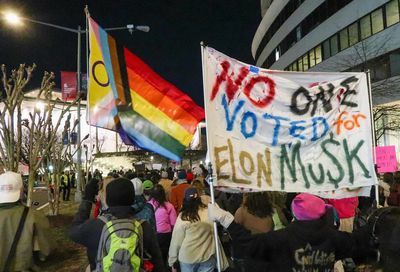Creating Change brought LGBTQ rights — and the families demanding them — to Congress
More than 500 Creating Change attendees overran the Hill to lobby for pro-LGBTQ legislation

As Sen. Tammy Baldwin stepped out of the Senate chamber and into one of the wings of the U.S. Capitol, she bent down close to the floor to greet a young girl in yellow shirt, black pants, and animal-print shoes peeking out from underneath a heavy wooden table. But 20-month-old Marietta Hargrove wasn’t ready to come out just yet.
After several attempts to coax Marietta out of her hiding place, Baldwin, with a smile on her face, turned to the toddler’s older sister, Joella, 9, and her parents, Camden Hargrove, 28, and Minta Dwyer, 36, of Madison, Wis., to give them her full attention, while Marietta slowly clambered up the table.
“She’s stolen the hearts of everyone in this room,” said a nearby Senate staffer, while observers cooed and smiled at Marietta’s antics.
The meeting with Baldwin was brief, but content-rich, as Hargrove and Dwyer chatted with the senator about her sponsorship of several pro-LGBTQ bills, including the Equality Act, which would prohibit anti-LGBTQ discrimination, and the Do No Harm Act, a bill that seeks to ensure that “Religious Freedom” is not used to justify discrimination, particularly against the LGBTQ community.
“It matters a lot to me to talk to the senator about the Do No Harm Act and the Equality Act,” said Hargrove, who works as a field organizer for the National LGBTQ Task Force. “As a black trans man, I know what it feels like to face intersecting marginalization.”
To illustrate the importance of those bills, Hargrove told Baldwin about how he was fired from his job as a nanny after he decided to transition.

“I was nannying for some children, and we had made a bond,” he recalled. “But as soon as I started testosterone to transition, the mom said she didn’t think it was safe for them to be around me because I was trans, and then fired me.”
For Hargrove, the chance to meet with Baldwin, share his story, and introduce her to his family was powerful. It helped him make the case that his family was worthy of protection, just like the family of any of her cisgender constituents.
“Senator Baldwin was very receptive and very sympathetic to my story,” he said following the meeting. “I think it was really important for me, specifically, to have my family here, because my family means so much to me and they’re such a big part of my life.”
Hargrove was one of more than 500 LGBTQ people who took part in The Task Force’s “Queer on the Hill” advocacy day on Thursday, Jan. 25, where LGBTQ people — many of whom were in town for the Annual Creating Change conference — could lobby their elected representatives on behalf of pro-LGBTQ legislation.
“This is where it all happens,” said Debra Hopkins, a 62-year-old transgender pastor and former secondary school history teacher from Charlotte, N.C. “I’m actually feeling good, and I think it’s the adrenaline working.” Hopkins and a contingent of North Carolinians visited their senators, Richard Burr and Thom Tillis, and several congressmen. For Hopkins, the chance to be “smack dab in the middle of government” was a chance she just couldn’t pass up.
“We didn’t come here to be passive, go to parties, or eat,” she said. “We need to have purpose in this existence we have. If we’re not doing that, you need to ask yourself at some quiet moment, ‘What have I done to contribute?'”
Elsewhere on the Hill, Ball State University students Evan Schacherer, 19, of McCordsville, Ind., and Carli Kiser, 19, of Evansville, Ind., were attempting to visit the office of their senator, Joe Donnelly, a Democrat who is up for re-election this year and is one of the GOP’s top targets. Both wanted to express their views to Donnelly about the importance of the Equality Act, but ended up speaking with the senator’s legislative counsel instead.
“They gave us pretty standard comments about their support,” said Schacherer, noting that the senator’s staffer didn’t explicitly say he supported the Equality Act. “I think it was mainly to cover themselves so it couldn’t bite them in the butt later.”
“Donnelly has an interesting record on LGBTQ issues,” added Kiser. “He has voted against two forms of the Equality Act, although he has changed some of his views on the LGBTQ community since 2013, and his [counsel] says he’s always been supportive. If I could, I’d like to stress to him the importance of every Hoosier, feeling safe and secure, feeling as if they belong in our state, and, if they want to stay in the state, feeling like it’s possible for them to do that.”
Brennan Keiser, a 27-year-old university employee from St. Louis, Mo., visited his the offices of his state’s senators, Claire McCaskill and Roy Blunt, and his congressman, Lacy Clay, to lobby on behalf of the “Ending Racial and Religious Profiling Act.” He said that McCaskill’s staff, in particular, was very responsive to his concerns.
“I felt positive about how receptive they were to everything,” he said after the meetings. “I thought they were listening, they were writing things down, and they seemed to be willing to continue having a conversation.”
Nicole Skinner, a 19-year-old University of Idaho student from Meridian, Idaho, came to the Hill alone — she was the only Idahoan to sign up for the lobby day. She visited her senators, Mike Crapo and Jim Risch, to ask them to support the Equality Act as well as a clean version of the DREAM Act, which would ensure undocumented people brought to this country as youths would be allowed to stay without fear of deportation.
“Their staffers were very polite about everything I said,” said Skinner. “Obviously, Idaho’s a very conservative state, so I don’t see my senators backing either of these pieces of legislation anytime soon. But I definitely think I brought some new points to the table, where maybe they had not heard those same perspectives before.”
For example, with the Equality Act, Skinner talked about the importance of protections for LGBTQ people in public accommodations by highlighting a specific coffee shop in Moscow, Idaho, where the University of Idaho is located, that has kicked out patrons that the owners believe are LGBTQ or on dates with someone of the same gender.
“I think that’s something that a lot of straight people don’t have to think about,” said Skinner. “Especially because the senators are graduates of the University of Idaho, giving them a specific coffee shop name that does that, that they’ve been to, gives them an idea of what’s going on.”
While some people at the lobbying day event might have been frustrated not to talk with their senator or congressman directly, Skinner said sharing personal stories, even if it’s just with staffers, felt worthwhile, because information does get passed along.
“I think one-on-one conversations are the best way to create change,” said Skinner. “We hear statistics and numbers and facts all the time — and those are important to back up our claims. But, at the end of the day, sharing our personal experiences is going to change more minds than anything else will.”
Support Metro Weekly’s Journalism
These are challenging times for news organizations. And yet it’s crucial we stay active and provide vital resources and information to both our local readers and the world. So won’t you please take a moment and consider supporting Metro Weekly with a membership? For as little as $5 a month, you can help ensure Metro Weekly magazine and MetroWeekly.com remain free, viable resources as we provide the best, most diverse, culturally-resonant LGBTQ coverage in both the D.C. region and around the world. Memberships come with exclusive perks and discounts, your own personal digital delivery of each week’s magazine (and an archive), access to our Member's Lounge when it launches this fall, and exclusive members-only items like Metro Weekly Membership Mugs and Tote Bags! Check out all our membership levels here and please join us today!






















You must be logged in to post a comment.